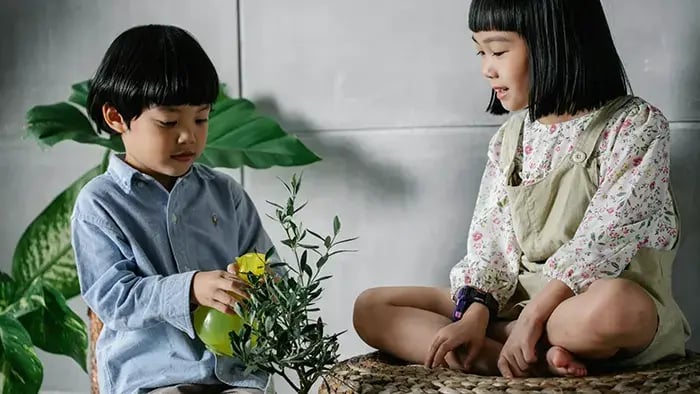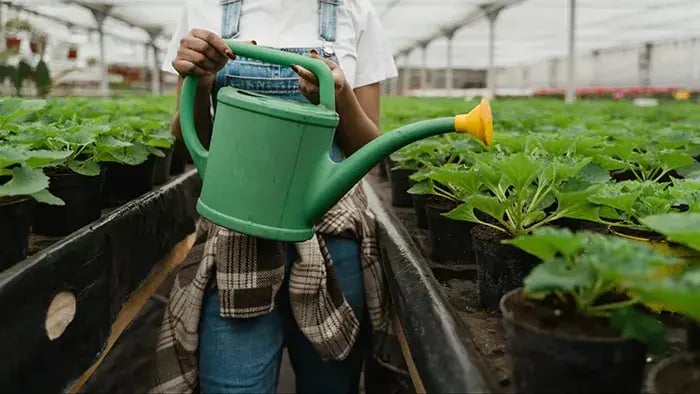- Indoor gardening
- Outdoor gardening
- Consequences
- Patience
- Routine
- Authority
- Mistakes
Introduction
Children, as they grow up, learn about many feelings and emotions. Aside from all the emotions, the sense of responsibility is the primary understanding in kids, and it describes emotional intelligence. Rationality and emotional intelligence dictate how well children interpret the sense of responsibility with proper decision-making. Parents are always facing the issue of teaching children these significant soft skills along with a sense of responsibility. Gardening can be a great way to teach children the sense of responsibility, helping them understand better. A sense of responsibility at a younger age can be very beneficial for children to grow mature and stable during adulthood with proper decision-making sense.
Understanding The Activity: Gardening
Parents can opt for different aspects of gardening for their children according to their suitability and the child's interest.
Indoor gardening

Indoor gardening is a low-maintenance method where children do not step outside but work with small plants and saplings inside the house. There is less physical activity involved in indoor gardening, and it can be used as a good mental exercise. Indoor plants are mostly associated with looking fancy or in terms of observation.
Outdoor gardening
Outdoor gardening involves children in rigorous physical activities. Children are encouraged to be outside for hours caring for their plants. Outdoor gardening has many other steps that indoor gardening may not have. Outdoor gardening can also help children experience the joy of harvesting.
Understanding The Term “Responsibility”

The term responsibility describes the ownership of the children while they are completing the task under their wing. Responsibility can also be described as this state or the quality of children's functions in decision-making.
How Gardening Can Foster Responsibility in Children
Gardening is a fantastic activity that goes beyond just growing pretty flowers or tasty vegetables. It's a wonderful way to teach children valuable life skills, particularly responsibility. Read along to know how:
1. Consequences
Taking care of plants teaches children about cause and effect. They will see firsthand how regular watering, proper sunlight, and care lead to healthy growth, while neglect can lead to wilting or death. This fosters a sense of responsibility for the well-being of something living.
2. Patience
Unlike instant gratification from video games or toys, gardens take time and effort. Kids learn patience as they wait for seeds to sprout, fruits to ripen, and flowers to bloom. The act of nurturing and caring for something over time teaches them the value of delayed gratification.
3. Routine

Plants thrive on consistency. Watering, weeding, and caring for a garden need to be done regularly. This teaches children the importance of routines and commitment to see a project through to fruition.
4. Authority
Watching a tiny seed transform into a beautiful plant or a delicious vegetable instills a sense of ownership and pride in children. They can point to their hard work and say, "I did that!" This accomplishment builds confidence and a sense of responsibility for their actions.
5. Mistakes
Gardening isn't always perfect. Overwatering, forgetting to weed, or accidental damage can happen. These mishaps can be used as guiding moments. Children learn from their mistakes and understand how to care for their plants better next time.
Other Benefits Of Gardening
There are plenty of other benefits that child can get from gardening:
- Productive time: Gardening can turn spare time into a protective time to help children learn more about the environment.
- Benefiting the community:Gardening can also benefit the community with greenery and fresh produce. Small gardening in each home can create a unique ecosystem for fresher oxygen and better-quality foods.
- New hobby: Gardening as a new hobby can be quite refreshing for children stuck with the same hobby, making them feel refreshed.
- Safe space: Gardening cannot only increase the kids' sense of responsibility but can also be a safe space for children to wind themselves up and refresh their minds.
Why Taking Responsibility Is Essential?
Taking responsibility is essential in children for these reasons:
- Taking responsibility from a younger age is critical for children to navigate in the future, leading through their adult life.
- Taking responsibility also helps children with proper decision-making and intellectuality, ensuring they are on the right track.
- Taking responsibility helps children be more Independent and bolder about their decisions.
- Children who are good at taking responsibility are more efficient in their tasks.
Conclusion
Now that you know how gardening can increase responsibility in children, what's the wait? Help your children develop this brilliant hobby and make it their way of life, doing good for the community with greater values. Gardening is also a sensitive hobby that involves plants, making children more independent and mature. Along with responsibility, children will discover a newer side of themselves while gardening.
Smriti is a content writer who creates clear, practical, and informative content backed by science and relevant data. With a strong understanding of structured writing, she breaks down complex topics into simple, actionable insights. Her work is focused on helping readers prepare, learn, and grow with confidence and clarity.
The views expressed are that of the expert alone.
The information provided in this content is for informational purposes only and should not be considered a substitute for professional medical advice, diagnosis, or treatment. Always seek the advice of your physician or another qualified healthcare provider before making any significant changes to your diet, exercise, or medication routines.
References:
https://www.rhs.org.uk/advice/health-and-wellbeing/children-getting-them-interested-in-gardening
https://blog.sensoryedge.com/what-gardening-teaches-kids-about-responsibility/










